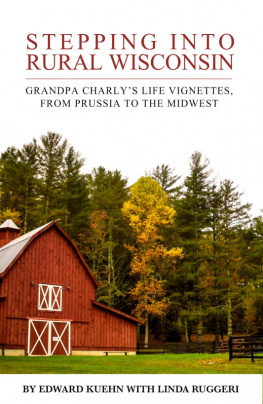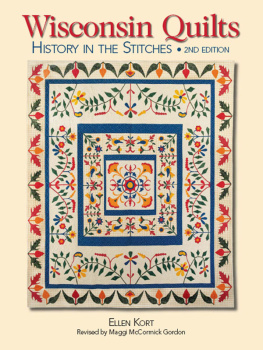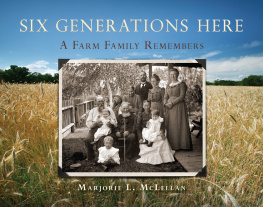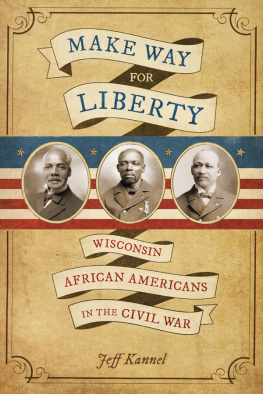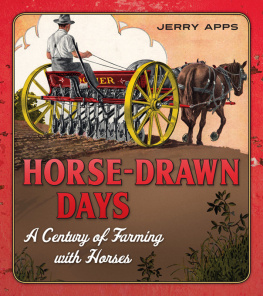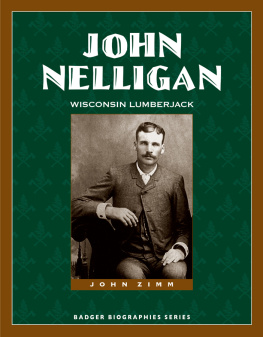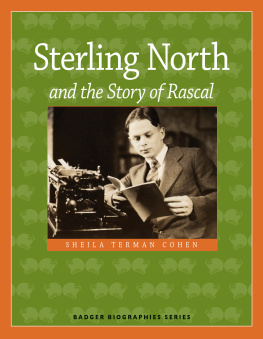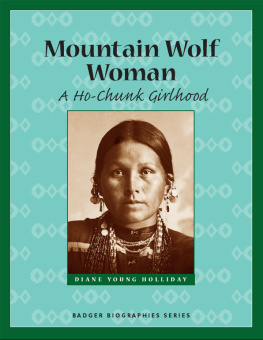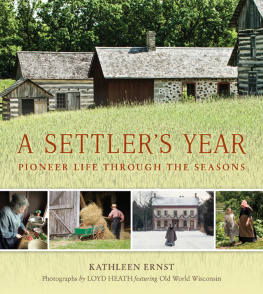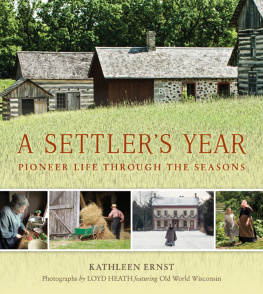What Others are Saying about Stepping Into RuralWisconsin
Debut author Kuehn collaborateswith debut co-author Ruggeri to pen a tribute to his paternalgrandparents in this look back at Wisconsin farm life during theend of the 19th and beginning of the 20th centuries... The resultis this celebration of the dignified, quiet, and unassuming livesled by the simple, hardworking folk who populated rural Wisconsin- Kirkus Reviews
Edward J. Kuehn, with Linda Ruggeri, writes adelightful story of his grandfather, Charly Kuehn. With carefulgenealogical and extensive additional research, the authors showthe reader what it was like living in rural central Wisconsin inthe late 1800s and early 1900s. Kuehn writes The story of mygrandparents is like that of so many other Americans, one ofimmigration, struggles, language barriers, never ending hard work,incalculable sacrifice and a large family that needed to benourished, educated, and launched into the word as good citizenscarrying the family name. My grandparents history is my history.-Jerry Apps, Rural Historian and author of Every Farm Tells aStory and Cold as Thunder
Stepping Into Rural Wisconsin
Grandpa Charlys Life Vignettes,
from Prussia to the Midwest
By Edward J. Kuehn and Linda T. Ruggeri
This eBook is licensed for your personal enjoymentonly. This eBook may not be re-sold or given away to other people.If you would like to share this book with another person, pleasepurchase an additional copy for each recipient. If youre readingthis book and did not purchase it, or it was not purchased for youruse only, then please return to your favorite eBook retailer andpurchase your own copy. Thank you for respecting the hard work ofthis author.
Stepping Into Rural Wisconsin
Edward J. Kuehn and Linda T. Ruggeri
Published by Linda T. Ruggeri for The InsightfulEditor
565 Pier Ave - Suite 1008
Hermosa Beach, CA 90254-9998
www.theinsightfuleditor.com
Smashwords Edition - 2018
Copyright 2017 Edward J. Kuehn and Linda T.Ruggeri
All rights reserved.
For information, suggestions, or comments, pleaseaddress theinsightfuleditor@gmail.com
This book is available in print at most onlineretailers, or by contacting the publisher.
ATTENTION: SCHOOLS AND BUSINESSES
Stepping Into Rural Wisconsin is available atquantity discounts with bulk purchases for educational, business,sales, or promotional use. For information, please contact or (310) 490-2110
This book is dedicated to my brother Carl, whopassed away before it was finished.
Edward J. Kuehn
To my father, for showing me the world throughbooks, and teaching me to be a voracious reader.
Linda T. Ruggeri
Tableof Contents
Introduction
I often visited my sister Alice on Saturdaymornings. She would always have a folder of saved articles alongwith a list of topics to remind her of what she wanted to talkabout with me. This particular day, the items were on the diningroom table, and she handed them to me as I was leaving, ready to gohome. My other sister, Elaine, had already looked through them. Nowit was my turn to review them and dispose of them as I saw fit. Ata first glance, I could tell these werent just old papers, butdocuments with a historical and familial significance. These twothick envelopes once belonged to our paternal grandfather.
I was 74 when this journey of discovering mypaternal grandfathers life began.
Of the envelopes, one contained an abstractfor real estate transactions in Ripon, dating back to 1854, whenthe city was being plotted. The documents described land parcels,financial transactions and mentioned the names of individuals andfamilies involved, providing me with an intersecting point of twostorylines. From a technical perspective, a documented history ofland deals for a portion of the City of Ripon, including land ourgrandfather would later come to own. And, from an emotionalperspective, a storyline for our familys history in Wisconsin,their whereabouts and doings. This farmstead abstract explained howthings unfolded that I had never really thought about when I wasyounger and living in Ripon. But more importantly, it told me thestory of someone I looked up to, loved and quietly admired, mygrandfather Charly.
This farm is where I got to know mygrandparents. By looking at these deeds and abstracts, interlacingthem with my memories of my relatives, searching through longstored away family photos (and really looking at the photos thistime), they all sparked questions and created conversations with mysiblings and cousins that I had never had before. My grandparentsfarm purchase in Ripon, impacted the whole immediate family and thegenerations that came after. Thanks to that farm, and the peoplewho lived there, Im here today writing these stories.
After extensive genealogy research, manyeager days and long nights thinking about who my grandparentsreally were, I wanted to recreate, through drawings and photos,what their farmstead might have looked like and how it evolved asimprovements were made to accommodate an ever-growing family. Thisled to writing down notes, with personal memories and anecdotes Ihad, to help me construct a more complete picture of them. Again,this book is based on my memories and conversations with familymembers. When there were gaps of information, I've filled them withwhat I believe happened based solely on my research of ruralWisconsin life at the time (and it is noted so in the text).
The first result of my research produced ashort book intended solely for my family, mainly transcribing thehandwritten mortgage abstract, with a few personal sketches andblack and white period photos of my grandparents (the completetranscribed abstract is available online atwww.theinsighfuleditor.com/portfolio.) It was a very technicalpiece, but it served as the backbone for the broader vignette-likestory I wanted to tell based on my recollections. My grandparentswere good, hardworking people, like those that made up the threadof America. Their story could be considered by todays standardsuneventful, undecorated but one of honest success. When placed inthe context of local, national or world history, their story becameto me more profound, more interesting and had greater value.
The story of my grandparents is like that ofso many other Americans, one of immigration, struggles, languagebarriers, never ending hard work, incalculable sacrifice, and alarge family that needed to be nourished, educated, and launchedinto the world as good citizens carrying the family name. Mygrandparents history is my history. Their blood is my blood. Andat the end of the day, their story has become my story too.
Edward J. Kuehn
Chapter1
Coming Back Home on the Texas Chief

Composite illustration of the Texas Chiefapproaching the Temple, Texas train station in the 1950s. Renderingby author.
Tuesday, June 6, 1956. After traveling forforty-five minutes in a bus without air conditioning, it felt goodto finally get off, stretch my legs, and find a restroom when wegot to the Temple, Texas train station.
The weather was quite hot for that early insummer, and the mixed smell of diesel, burnt rubber andsmog-covered asphalt seemed to emanate like steam from the parkinglot. My clothes had already wrinkled, and I was sweating, eventhough the day had just begun. This was my first summer in Texasand I was oblivious to the hot weather and humidity that so markedthis state.
Earlier that morning, I had been called intothe first sergeants office. I was still feeling edgy about ourunexpected meeting. In the past couple of weeks my mother had sentletters to him directly, asking that I be allowed to come home formy brothers graduation. Graduating from high school was a bigevent in our family, and especially this one, since my youngestbrother Carl would be the last child of my parents to finishschool. Two months earlier, in April, I had missed my oldersisters Elaines wedding because my three-day pass request hadbeen denied. Per the Army, at that time, I was
Next page
